It is silage cutting season in Inch, Co Clare - a rural townland west of Ennis that not many outside the parish had heard of until this week.
It is also communion season, and Clare hurlers are doing well in the GAA championship - normal routines as expected as they head into the summer.
But the quiet tranquility of rural life along a narrow country road was suddenly disrupted last Monday night when neighbours close to the Magowna House hotel noticed a bus pull into the facility with 33 people, male asylum seekers, onboard.
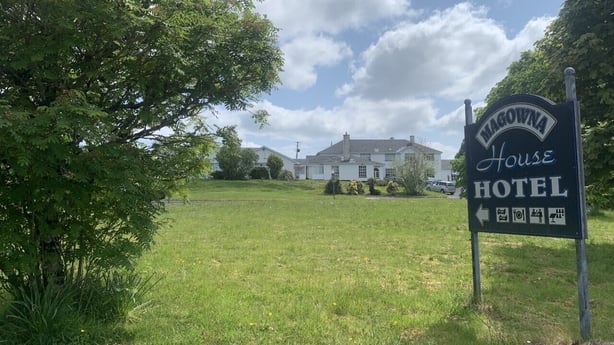
Word spread quickly and resistance set in. Within a short time, two tractors and bales of wrapped silage were placed at two entrances to the access road leading to the hotel.
Bales of silage and a tractor were also placed at the two entrances to the hotel itself, which consists of a large hotel building with a conference meeting hall and three holiday home bungalows onsite.
Locals were flabbergasted that a large group of men had arrived at the facility out of the blue.
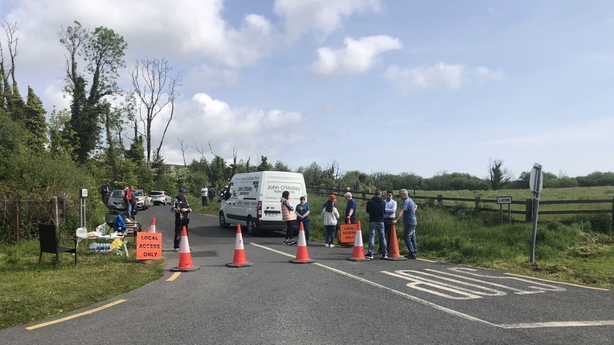
The use of the facility for housing asylum seekers had certainly been circulating, and locals had voiced their opposition at a meeting a week ago.
However, they said they were led to believe that it wasn't going to happen in the short-term, as fire certification and sewage issues at the hotel make it unsuitable for such accommodation. And they had seen a letter from Clare County Council to this effect.
And suddenly in the still of a May evening all that changed. A group of asylum seekers were driven by bus up the narrow country road to the hotel without much notice.
Locals believed that more buses were on the way as a figure of 69 men had been mooted as being accommodated there.
Local people were upset. They gathered at the access road, and at the entrance to the hotel talking in absolute disbelief that this had happened. They formed barricades, made up of large agricultural machinery and bales of farming fodder.
But above all, they were really angry and felt they had been duped. After being led to believe that the premises was unsuitable, they felt it was almost as if by stealth and in secret, that a group of asylum seekers - traumatised and vulnerable strangers to them all - had been placed in their midst by the Government and the authorities far away in Dublin.
Suddenly the tiny townland of Inch, marked only by a sign and the small Mary of the Wayside church and local school, was making national news, and making the Government very uncomfortable.
This tiny townland was now the focus of the growing disquiet among communities about housing asylum seekers and making headlines about the lack of consultation with those communities about how they feel, and certainly about trying to bring them onside.
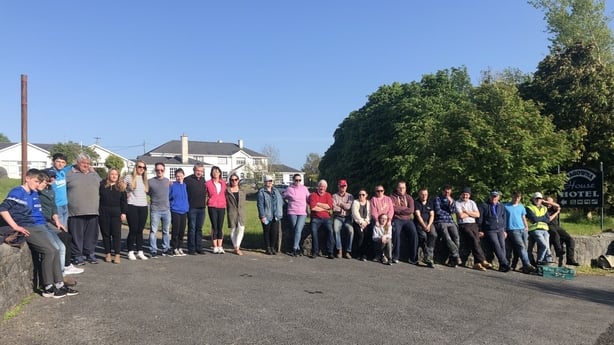
For the asylum seekers, some are unhappy with the isolated location of Magowna house and feel intimidated and threatened by the local reaction.
Some, this week, said: "We feel unwelcome, we feel threatened by the activity outside and we want to leave. It is too isolated, too far from the nearest town. We would prefer to be in a city. We have heard that some other men have been moved from Citywest to Red Cow. We are not happy here. We want to leave."
Eimear O'Connor from Clare Immigrant Support arrived along with two colleagues to try and assist the men, but was met initially with hostility by locals at the roadblock. She had to seek garda help to gain access and do her work.
"We have no role in sorting out the disagreement and discontent which has emerged, but I do have a view on the accommodation here which is that however unsuitable it is, it is certainly better than living in a tent at the direct provision centre in Knockalisheen, or on the streets of Dublin," she said.
"l would hope matters would calm down and that the asylum seekers would be allowed settle in, and local people would see they have nothing to fear," she added.
Co Clare is no stranger to housing vulnerable people from across Europe and the world. Back in the 1990s the local Red Cross was frequently called to Shannon Airport where families arrived from the Middle East on flights in transit and then sought asylum here.
Ennis is one of the most multicultural towns in the country. Its schools are full of different nationalities - up to 40 in some schools. Their GAA teams are a complete and complementary mix of people of different cultures and backgrounds. They have taken in 4,500 Ukrainian refugees in places like Lisdoonvarna, Kilkee, Ballyvaughan and Ennis, one of the highest numbers of refugees anywhere in the country.
Common utterances from locals throughout the week were: "This is not a racist thing. We are not against asylum seekers seeking shelter, just not in this location. It's totally unsuitable."
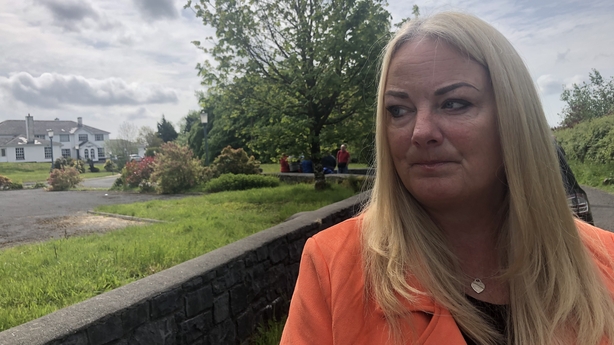
"This is simply a completely unsuitable location for this volume of men - and women in particular feel vulnerable. They told me they would feel exactly the same if it was a large group of Irish men," said Deputy Mayor of Ennis, Councillor Mary Howard echoing the calls of concern she had received.
But as time moved on, the locals didn’t seem to be able to shed the racist label and were upset by the many comments on social media who pinned that very tag on them.
Nevertheless, local rural communities remained steadfast in their opposition, settling in to do 24-hour rostered rotas around a set of traffic cones and 'no entry signs' with chairs, sandwiches, bottles of water, and a fire in an old barrel for warmth at night.
Clare Senator Timmy Dooley led a number of talks over several hours on Tuesday evening with a delegation of local people and the operator of the facility and there appeared to be goodwill that a resolution could be found that all parties could live with.
There was also a video meeting between Clare Oireachtas members on Wednesday morning in which it became clear that Minister for Integration Roderic O'Gorman ruled out closing the facility in the face of the historic crisis facing the country in sheltering asylum seekers and refugees. Every single accommodation facility simply had to be used as capacity peaked.
There was a complete hardening of attitudes locally when his remarks emerged, and locals also discovered that instead of 20 men staying at the location which they had been told the night before, there were 29, so they questioned how they could believe anything that they were being told.
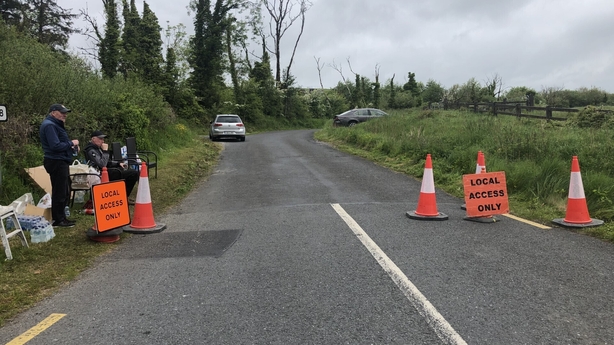
"There has been a total breakdown of trust," one local man said.
That was it. The minister was not for turning, and the people of Inch were not giving an inch. The physical road barriers were a manifestation of the mind barriers to finding a solution.
Then a Government minister turned up, albeit a junior one, in Minister of State for Integration Joe O’Brien. He met locals, surveyed the accommodation, but carried the message of his senior colleague. The facility would not be closed, but there would be a pause on additional arrivals for four weeks and he would come back to them.
This seemed to be the Government olive branch - a compromise of a time interval to see if things would settle down. But locals didn’t take it and the barriers remain, their fear being that once that time interval passes, what then?
For them, the Government's attempt at consultation was too little, too late.
Consultation was raised as a major issue. There were accusations from the Opposition that the Government completely mismanaged the situation. Refugee and asylum seeker support groups said that local people need to be consulted, kept informed and supported as part of the integration process.
But the Government said it is trying to secure accommodation for people seeking sanctuary in Ireland, and the most basic of needs for vulnerable people fleeing conflict, in the worst refugee and asylum seeker crisis in our history. The State has an international obligation.
Calls from Taoiseach Leo Varadkar for the community to end their blockade have gone unanswered.
Tánaiste Micheál Martin acknowledged they must do better on communication, with some straight talking on RTÉ's The Late Late Show. He said it is not easy because sometimes there may be a fear that if people get alerted earlier there will be protests.
No one is happy with the current situation - local communities or the asylum seekers.
For now, the situation continues but locals this weekend said they will remove their blockade, though continue to oppose the housing of asylum seekers at Mogowna House hotel.







